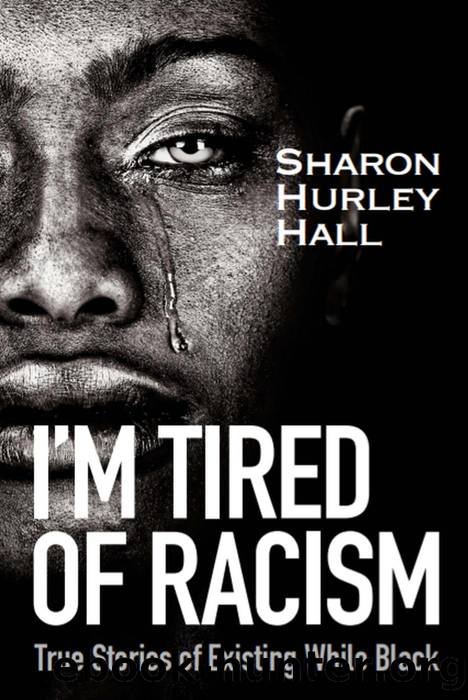I'm Tired of Racism by Sharon Hurley Hall

Author:Sharon Hurley Hall
Language: eng
Format: epub
Publisher: Sharon Hurley Hall
Published: 2022-09-15T00:00:00+00:00
18
Oh, The Gaslighting
A white personâs need for comfort does not negate my experience as a Black woman
Letâs get something straight: I recognize racism when I see it.
As Rebecca Stevens Alder pointed out in âI Donât See That I Am Black, You Do,â Iâve had plenty of time to hone those skills.
Iâve seen the surprise when I walk into an interview room, Iâve had my qualifications and expertise doubted, Iâve been offered reduced pay, Iâve been fetishized, and Iâve been targeted while traveling.
So let me say it again: I know racism when I see it and when I experience it.
Thatâs why when I read an article on racist phrases to avoid â in which Ono Mergen said, âWe know full well when something is racist. Stop questioning us and start challenging the status quoâ â I jumped in with the following comment: âSo tired of well-meaning people trying to explain away a racist microaggression. When you experience racism regularly, you always recognize it.â
Several people took exception to that, but one white man in particular saw my comment about recognizing racism as a statement that he was racist. And truly, it wasnât about him.
(Of course, he tried to make it about him by writing an entire article to support his own claim that he was not racist â which, to be clear, I had never accused him of. I was having a conversation with the author of the piece Iâd just read.)
Someone else jumped into the conversation by implying that Black people see racism everywhere.
All Iâm going to say here is: we see it where it exists. You can draw your own conclusions about whether thatâs everywhere or not.
I have to admit, Iâm tired of the gaslighting. For some white people, the fact that they were unaware of racist intentions is absolution in their own eyes. However, thatâs not enough for most Black people.
Itâs the old issue of intention versus impact. Letâs talk about that in relation to parenting. When two kids are throwing a ball to each other, and one accidentally hits the other with it, we teach them to apologize for the impact, even if the intention wasnât there. It should be the same with racism, which is way more serious.
If I, as a Black woman or BIPOC, tell you how your words or actions affect me, thatâs enough reason to 1) apologize and 2) never do it again.
Gaslighting is not a reasonable response.
I donât want to hear that I imagined it or I canât take a joke or any of the myriad comments that minimize my justified pain.
I donât want to be blamed when Iâm actually the victim, and I certainly donât want my tone policed.
I donât want to be asked if Iâm sure or told that itâs not about race.
I donât need people to play devilâs advocate for racists â theyâve already had it their way for centuries.
I want you to apologize, mean it, and do better.
As I pointed out in my further response to the self-appointed gaslighter:
Download
This site does not store any files on its server. We only index and link to content provided by other sites. Please contact the content providers to delete copyright contents if any and email us, we'll remove relevant links or contents immediately.
| Diaries & Journals | Essays |
| Letters | Speeches |
The Rules Do Not Apply by Ariel Levy(4946)
Bluets by Maggie Nelson(4541)
Too Much and Not the Mood by Durga Chew-Bose(4324)
Pre-Suasion: A Revolutionary Way to Influence and Persuade by Robert Cialdini(4205)
The Motorcycle Diaries by Ernesto Che Guevara(4078)
Walking by Henry David Thoreau(3946)
Schaum's Quick Guide to Writing Great Short Stories by Margaret Lucke(3368)
What If This Were Enough? by Heather Havrilesky(3302)
The Daily Stoic by Holiday Ryan & Hanselman Stephen(3292)
The Day I Stopped Drinking Milk by Sudha Murty(3184)
The Social Psychology of Inequality by Unknown(3011)
Why I Write by George Orwell(2942)
Letters From a Stoic by Seneca(2784)
A Short History of Nearly Everything by Bryson Bill(2679)
A Burst of Light by Audre Lorde(2586)
Insomniac City by Bill Hayes(2535)
Feel Free by Zadie Smith(2473)
Upstream by Mary Oliver(2382)
Miami by Joan Didion(2362)
